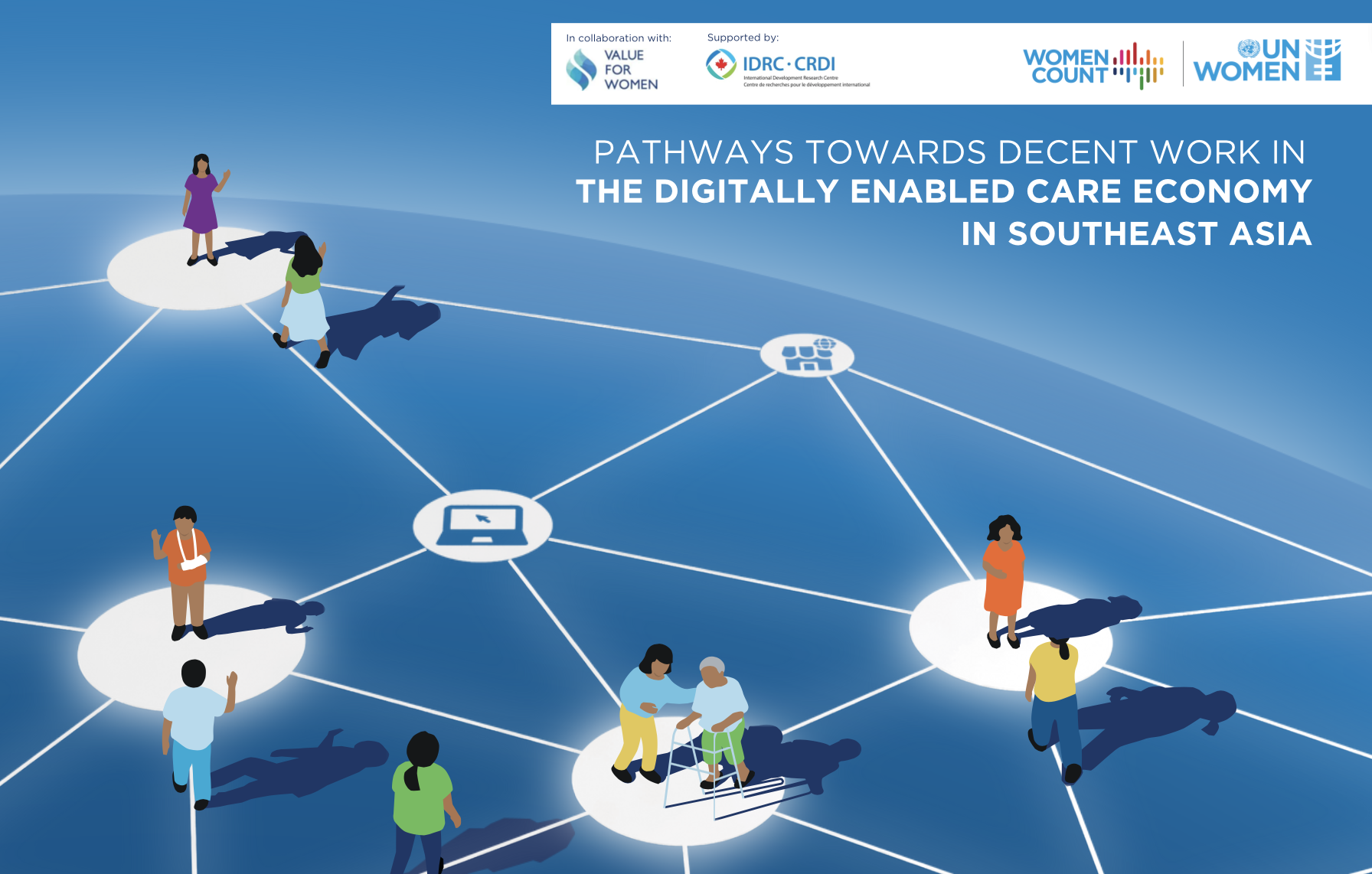New research reveals that digitalization can set innovative pathways towards decent work in the digitally enabled care economy in South-East Asia
Date:
Author: Zoya Khanday

Bangkok, Thailand – UN Women has released a report entitled Pathways towards Decent Work in the Digitally Enabled Care Economy (DECE) in South-East Asia. The report explores innovative enterprise models emerging in the care economy. The care economy represents the vital goods and services, that contribute to the well-being of care-dependent groups, such as children, older people and people who are ill, and people with disabilities, as well as common domestic tasks like for example cooking, cleaning and other household chores. In South-East Asia, this sector has undergone significant digital transformation, yet there is limited evidence to guide decisions for creating a more inclusive care economy.
The research findings show the contribution of innovative businesses to decent working conditions for the predominantly female workforce in the care economy and how technology can enhance care provision and improve the working conditions of digitally enabled care workers.
“In an era of rapid digitalization that is reshaping the care landscape in South-East Asia, we must recognize the essential role that innovative enterprises play in offering quality care, which is also affordable and accessible. By providing job opportunities, reducing time constraints, and upholding the fundamental human right to care, these enterprises contribute to women’s empowerment as a core principle of economic wellbeing and a wellbeing economy!”, said Ms. Alia El-Yassir, Regional Director for Asia and the Pacific, UN Women.
The key research findings underscore critical aspects of the digitally enabled care economy:
- Good practices were observed among digitally enabled care enterprises that serve as pathways to achieving decent work. These enterprises can play a crucial role in accelerating progress toward decent work in the care economy.
- Digitally enabled care enterprises facilitate decent work in the care economy in four key dimensions: flexibility and autonomy; entitlements and protection; income; and strengthened representation. For instance, digitally enabled care enterprises may protect care workers through written or oral agreements defining task scope, working hours, and living conditions, while also enhancing worker safety through vetting clients.
- There is an urgent need to extend the coverage of labour laws and standards to include digitally enabled care workers, including domestic workers. The absence of dedicated international labour standards at the intersection of the digital economy and the care economy limits worker protection, and further regulatory development and/ or updates are necessary.
- The care economy, particularly its digital component, is permeated by conceptual and gender data gaps. The lack of comprehensive and internationally agreed concepts and definitions on the care economy leads to gender data gaps and knowledge deficiencies in the research and policymaking within this domain.
- The digitally enabled care economy is characterized by the growth and diversity of its enterprises. The sector is experiencing rapid expansion and evolution, with enterprises offering a range of services and attracting educated and skilled workers. This trend has potential to professionalize the sector.
"Cognizant of the critical data and evidence gaps on what works within the care sector, this frontier research offers clear recommendations for policymakers and ecosystem actors and underscores the need for collaboration between the public and private sector as a catalytic force for progress towards decent work in the digitally enabled care economy." added Erin Tansey, Director, Sustainable and Inclusive Economies Program, Canada’s International Development Research Centre.
These findings are based on extensive interviews of more than 595 workers and 120 customers in the digitally enabled care economy, conducted by UN Women in collaboration with leading women-owned enterprises in the sector across four countries: LoveCare (Indonesia), Kiddocare (Malaysia), Aseana (Singapore), and Kiidu (Thailand).
The report includes recommendations directed at Governments and policymakers, enterprises and ecosystem actors to improve working conditions and empower women economically in the digitally enabled care economy. Proposed measures include ratifying international labour standards, enhancing policies for migrant workers, incentivizing enterprises to improve working conditions, setting skill standards and bolstering advocacy efforts.
Enterprises should digitize processes while maintaining offline connections, promote transparent business practices, and collaborate with Governments to support policies for decent care work. Furthermore, ecosystem actors are encouraged to invest in women-owned care enterprises, involve customers in ensuring decent work conditions and invest in sex-disaggregated care data and research.
The UN Women Regional Office for Asia and the Pacific conducted the research in collaboration with Value for Women and with the generous support of the International Development Research Centre (IDRC) and the Open Society Foundations – Soros Economic Development Fund global research programme on Transforming the Care Economy through Impact Investing.
The release of this report marks a crucial step towards addressing the challenges and opportunities within the digitally enabled care economy, emphasizing the importance of collaboration and informed action to advance the rights and well-being of care workers and the realization of the universal right to care in South-East Asia.
For access to the full report and detailed recommendations, please visit the provided link.
For media inquiries or further information, please contact:
- Zoya Khanday
Communications Consultant
UN Women Regional office for Asia and the Pacific
Email: [ Click to reveal ]
About UN Women:
UN Women is a global champion for gender equality, working to develop and uphold standards and create an environment in which every woman and girl can exercise her human rights and live up to her full potential. UN Women is a trusted partner of advocates and decision-makers from all walks of life, and it is a leader in the effort to achieve gender equality. For more information, visit http://unwomen.org/en